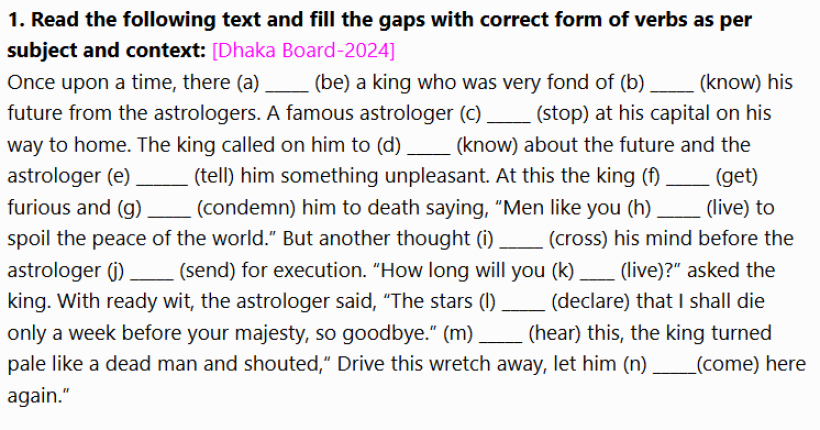| English Text | বাংলা অনুবাদ |
|---|---|
| Once upon a time there lived a bird. It was unlettered. It sang but couldn’t recite a word of scripture. It hopped and it flew but lacked all sense of manners. | এক সময়ে ছিল একটি পাখি। সে ছিল অশিক্ষিত। সে গান গাইত, কিন্তু শাস্ত্রের একটি শব্দও বলতে পারত না। সে লাফাত, উড়ত, কিন্তু শিষ্টাচারের কোনো ধারণা ছিল না। |
| The King said, “Such a bird is of no use. Yet it devours fruit from the forest, bringing down the profits of fruiterers in the royal market.” | রাজা বললেন, “এমন একটি পাখি কোনো কাজের নয়। তবুও এটি জঙ্গলের ফল খেয়ে রাজবাজারের ফল বিক্রেতাদের মুনাফা কমিয়ে দিচ্ছে।” |
| He summoned the Minister and commanded, “Educate the bird!” | তিনি মন্ত্রীকে ডেকে আদেশ দিলেন, “পাখিটিকে শিক্ষিত করো।” |
| The task of educating the bird fell on the King’s nephews, his sisters’ sons. | রাজা শিক্ষাদানের কাজটি তাঁর ভাগ্নেদের দিলেন। |
| The learned men of the court deliberated long. They pondered the reasons behind the ignorance of the creature in question. The conclusion: the bird’s nest made of straw and twigs could not hold much knowledge. Therefore, the first thing needed was a proper cage. | পণ্ডিতেরা অনেক চিন্তাভাবনা করলেন। তারা দেখলেন, পাখিটির অজ্ঞতার কারণ হলো এর বাসা খড় ও ডালের তৈরি, যেখানে বেশি জ্ঞান রাখা যায় না। তাই প্রথমেই প্রয়োজন একটি ভালো খাঁচা। |
| The royal scholars received handsome fees and happily went home. | রাজপণ্ডিতেরা মোটা পারিশ্রমিক পেয়ে আনন্দের সঙ্গে বাড়ি ফিরলেন। |
| A goldsmith set to work on a gilded cage. It turned out to be of such exquisite workmanship that people from far and near crowded round for a look. Some said, “This is education par excellence.” Others said, “Even if it learns nothing, it has got the cage. What a lucky bird.” | স্বর্ণকার একটি সোনার খাঁচা বানাতে লাগলেন। খাঁচাটি এমন সুন্দর হলো যে দূর-দূরান্ত থেকে মানুষ দেখতে এলো। কেউ বলল, “এটাই তো চরম শিক্ষা।” অন্যরা বলল, “যদি কিছু না-ও শেখে, তবু এমন খাঁচা পেয়েছে—সত্যি ভাগ্যবান পাখি!” |
| The goldsmith was delighted to get a bagful of money as reward and went home at once. | স্বর্ণকার এক থলি টাকা পুরস্কার পেয়ে খুশিতে বাড়ি চলে গেলেন। |
| A teacher came to give lessons to the bird. He took a pinch of snuff and declared, “This isn’t a matter of just a few texts.” | পাখিটিকে পড়াতে এক শিক্ষক এলেন। তিনি নস্যি টেনে বললেন, “এ তো কয়েকটি বইয়ের ব্যাপার নয়।” |
| One of the royal nephews sent for scribes. They made multiple copies of various texts until there was a veritable mountain. “Bravo!” exclaimed those who saw it, “There is no room for any more knowledge.” | রাজপুত্রদের একজন লেখক ডেকে পাঠালেন। তাঁরা এত বইয়ের অনুলিপি করলেন যে একেবারে পাহাড় তৈরি হলো। যারা দেখল, বলল, “বাহ! আর কোনো জ্ঞানের জায়গা নেই।” |
| The scribes loaded their wages onto bullocks and merrily headed home. They would never again want for anything. | লেখকেরা তাঁদের পারিশ্রমিক গরুর গাড়িতে তুলে আনন্দের সঙ্গে বাড়ি রওনা দিলেন। তাঁদের আর কোনো অভাব রইল না। |
| The nephews were constantly busy looking after the expensive cage. Repairs were always under way. Anyone who saw the endless dusting, wiping, and polishing had to agree that there was “marked improvement.” | ভাগ্নেরা ব্যস্ত ছিল দামি খাঁচাটি দেখাশোনায়। সারাক্ষণ সংস্কার চলত। যে-ই দেখত, বলত, “অবশ্যই উন্নতি হচ্ছে।” |
| A large maintenance crew was needed, and more personnel to supervise them. They all got handsome monthly salaries, which they saved in their wooden chests. Even their cousins came to live with them in cushioned comfort. | খাঁচা দেখাশোনার জন্য বড় এক দল প্রয়োজন হলো, তাদের তদারকির জন্য আরও লোক লাগল। সবাই মোটা মাসিক বেতন পেল। তারা কাঠের সিন্দুকে তা জমা রাখল। এমনকি তাদের আত্মীয়রাও এসে আরামে থাকতে লাগল। |
| English Text | বাংলা অনুবাদ |
|---|---|
| The world is short of many things but not detractors. They said, “The cage looks better no doubt, but has anyone taken notice of the bird?” | পৃথিবীতে অনেক জিনিসের অভাব আছে, কিন্তু নিন্দুকের অভাব নেই। তারা বলল, “খাঁচাটি সুন্দর দেখাচ্ছে বটে, কিন্তু পাখির খবর কেউ নিয়েছে?” |
| This was reported to the King. He said to a nephew, “What’s this I hear?” | এই কথা রাজার কানে গেল। রাজা এক ভাগ্নেকে বললেন, “আমি কী শুনছি?” |
| “Your Majesty,” replied the nephew, “If you wish to hear the truth summon the goldsmiths, the scholars, the scribes, the maintenance crew and their supervisors. Those who haven’t got a share of the royal bounty are resorting to slander.” | “মহারাজ,” ভাগ্নে উত্তর দিল, “আপনি যদি সত্য শুনতে চান তবে সোনারকার, পণ্ডিত, লেখক, কর্মচারী ও তাদের তত্ত্বাবধায়কদের ডাকুন। যারা রাজপুরস্কার পায়নি, তারাই এখন অপবাদ দিচ্ছে।” |
| Everything became clear to the King and he rewarded his nephew with a gold chain. | সব কিছু রাজার কাছে স্পষ্ট হলো এবং তিনি ভাগ্নেকে সোনার হার উপহার দিলেন। |
| The King wished to see for himself at what an awesome pace the bird’s schooling was going on. One day he turned up at the schoolroom with his friends, counselors and courtiers. At once the musicians at the gate struck up on their many wind and percussion instruments. The teachers shook their sacred tufts of hair as they loudly chanted mantras, and all the workmen, labourers, goldsmiths, scribes and their numerous cousins raised slogans in praise of the King. | রাজা নিজে দেখতে চাইলেন যে, পাখির শিক্ষার কাজ কী চমৎকারভাবে চলছে। একদিন তিনি বন্ধু, উপদেষ্টা ও সভাসদদের নিয়ে স্কুলঘরে গেলেন। সঙ্গে সঙ্গে দরজার সঙ্গীতশিল্পীরা বিভিন্ন বাদ্যযন্ত্রে বাজাতে লাগল। শিক্ষকরা চুলের গুচ্ছ ঝাঁকিয়ে মন্ত্র পাঠ করতে লাগলেন, আর কর্মচারী, মজুর, সোনারকার, লেখক এবং তাদের আত্মীয়রা রাজাকে প্রশংসা করতে করতে স্লোগান দিতে লাগল। |
| A nephew commented, “Your Majesty can see how things are going on.” | এক ভাগ্নে মন্তব্য করল, “মহারাজ, আপনি নিজেই দেখতে পাচ্ছেন কী সুন্দর চলছে।” |
| “Astonishing!” replied the King. “The din isn’t negligible.” | রাজা বললেন, “অবিশ্বাস্য! শব্দও কম নয়।” |
| “Not only the noise,” said the nephew. “The meaning behind it isn’t negligible either.” | ভাগ্নে বলল, “শুধু শব্দ নয়, এর অন্তর্নিহিত অর্থও কম নয়।” |
| The King was pleased and walked out the gate to mount his elephant when one of the fault-finders, who had been lurking behind bushes, shouted, “Have you seen the bird, Your Majesty?” | রাজা খুশি হয়ে হাতিতে চড়তে যাচ্ছিলেন, এমন সময় এক নিন্দুক, যে গাছের আড়ালে লুকিয়ে ছিল, চিৎকার করে বলল, “মহারাজ, আপনি কি পাখিটিকে দেখেছেন?” |
| The King was startled. He said, “There! I’d forgotten about it. We haven’t seen the bird.” | রাজা অবাক হলেন। বললেন, “আরে! আমি তো ভুলেই গিয়েছিলাম। আমরা পাখিটিকে দেখি নি।” |
| He went back and said to the teacher, “We must see the manner in which you conduct the lessons.” | তিনি ফিরে গিয়ে শিক্ষকের কাছে বললেন, “আমরা দেখতে চাই, আপনি কীভাবে শিক্ষা দেন।” |
| A demonstration followed. It pleased the King no end. The manner was so advanced that the bird was hardly visible. It seemed not at all necessary to see the bird. The King was satisfied that there was no flaw in the arrangements. Inside the cage there was neither any grain nor a drop of water. Only reams of text were being torn and fine pieces of paper thrust into the bird’s mouth with the point of a quill. Not only had the singing stopped, there wasn’t even scope for screeching. It was thrilling to watch. | প্রদর্শন শুরু হলো। রাজা ভীষণ আনন্দ পেলেন। শিক্ষা দেওয়ার ধরন এত উন্নত ছিল যে পাখিটিকে প্রায় দেখা যাচ্ছিল না। আসলে দেখা প্রয়োজনও মনে হচ্ছিল না। রাজা খুশি হলেন যে সব আয়োজন নিখুঁত। খাঁচার ভেতরে ছিল না এক দানা শস্য, না এক ফোঁটা জল। শুধু বইয়ের পৃষ্ঠা ছিঁড়ে কাঁটাগুঁটির ডগা দিয়ে পাখির মুখে ঢোকানো হচ্ছিল। গান বন্ধ তো বটেই, চিৎকার করারও সুযোগ ছিল না। দেখা সত্যিই রোমাঞ্চকর লাগল। |
| This time, as the King mounted the elephant he ordered the officer entrusted with testing the ears of mischief-makers to deal with the fault-finder. | এবার রাজা হাতিতে চড়ার সময় আদেশ দিলেন—যে অফিসার দুষ্ট লোকদের কানের বিচার করে, সে যেন ঐ নিন্দুকের সঙ্গে উপযুক্ত আচরণ করে। |
🦜 The Parrot’s Tale — Summary (বাংলায় সারসংক্ষেপ)
রবীন্দ্রনাথ ঠাকুরের গল্প “The Parrot’s Tale” বা “টিয়াপাখির গল্প” একটি ব্যঙ্গাত্মক রচনা, যেখানে অন্ধ অনুকরণ ও ভণ্ড শিক্ষাব্যবস্থার তীব্র সমালোচনা করা হয়েছে।
গল্পে দেখা যায়, এক রাজা ছিলেন যিনি তাঁর একটি অশিক্ষিত টিয়াপাখিকে শিক্ষিত করতে চান। পাখিটি গান গাইতে পারত, উড়ত, কিন্তু শিষ্টাচার জানত না। রাজা মনে করলেন, এই অশিক্ষিত পাখি রাজ্যের ক্ষতি করছে, তাই তিনি আদেশ দিলেন—পাখিটিকে শিক্ষিত করা হোক।
মন্ত্রী, পণ্ডিত, স্বর্ণকার, শিক্ষক, লেখক—সবাই মিলে পাখির “শিক্ষা” শুরু করল। তারা প্রথমে পাখির জন্য দামী সোনার খাঁচা বানাল, তারপর অসংখ্য বইয়ের নকল তৈরি করল, যেন জ্ঞানের পাহাড়। কিন্তু আসল শিক্ষা বা বোঝাপড়া কিছুই হলো না। সবাই শুধু রাজকীয় পুরস্কার ও বেতন নিয়ে সন্তুষ্ট হলো।
রাজা যখন পাখির অগ্রগতি দেখতে এলেন, তখন দেখলেন বাইরে অনেক শব্দ, গানে, স্লোগানে চারদিক মুখর। রাজা ভাবলেন, শিক্ষার বিশাল উন্নতি হয়েছে। কিন্তু আসলে কেউ পাখিটিকে দেখেনি! পাখিটি খাঁচার ভেতরে ক্ষুধার্ত, তৃষ্ণার্ত, নিস্তেজ হয়ে গেছে। শেষে রাজা যখন সত্য জানতে চাইলেন, তখনও সবাই বাহ্যিক চাকচিক্যেই ব্যস্ত ছিল।
অবশেষে দেখা যায়, পাখিটি নিঃশব্দ—তার গান, প্রাণ, স্বাধীনতা সব হারিয়ে গেছে। শিক্ষা নয়, বরং আড়ম্বর, কৃত্রিমতা ও দমন তাকে মেরে ফেলেছে।
🟢 Short Summary (for 5-mark question)
The story “The Parrot’s Tale” by Rabindranath Tagore is a satire on the rigid and meaningless education system. The king wanted to educate an unlettered bird. So, he ordered his ministers and scholars to teach it. They built a golden cage, collected piles of books, and held ceremonies—but no one actually cared for the bird. The bird starved and suffocated inside the cage. Finally, the king believed the bird had become educated, though it had lost its life. The story shows how false education destroys life and spirit.
🟡 Long Summary (for 10-mark question or paragraph writing)
Rabindranath Tagore’s “The Parrot’s Tale” is a powerful satire on the mechanical and artificial education system that focuses on appearance rather than true learning.
Once there was a bird that could sing and fly but was unlettered. The king thought it was useless and ordered his ministers to “educate the bird.” The scholars, goldsmiths, and scribes all got involved. They built an expensive golden cage and filled the surroundings with piles of books. Teachers, writers, and workers kept themselves busy showing off their “education project.” Everyone received handsome rewards from the king.
When the king came to see the progress, he found the place full of noise and activity, but no one had actually noticed the bird. The poor creature was locked inside the cage—hungry, thirsty, and silent. It was being “taught” by stuffing papers into its mouth. In the end, the bird died inside the cage, but everyone celebrated it as the success of education.
Through this irony, Tagore exposes the false, mechanical education system that kills creativity, freedom, and the soul of a learner.
💡 Moral / Theme of the Story (in English)
True education enlightens the mind; false education imprisons it.
The story criticizes rote learning, blind obedience, and lifeless schooling.
Real learning comes from freedom, curiosity, and understanding—not from force or show.
The golden cage symbolizes a system that values form over spirit.
Tagore’s message is timeless: education must nurture life, not destroy it.
🌸 In One Line:
“Real education gives wings to the mind; false education builds a golden cage.”
Word – Meaning | Synonyms | Antonyms | Derivatives |
|---|---|---|---|
bagful of money (এক থলি/ব্যাগ ভরা অর্থ) | a lot of money, pile of money | — | — |
bounty (পুরস্কার, অনুদান) | prize, reward | penalty (শাস্তি) | bounteous (adj.), bountiful (adj.) |
cage (খাঁচা) | frame, jail, prison | — | caged (adj.) |
command (আদেশ দেওয়া) | order, instruct | obey | command (n.), commanded (adj.), commanding (adj.) |
constantly (নিরবচ্ছিন্নভাবে) | always, continually | intermittently | constant (n.) |
deliberate (বিবেচনা করা) | think, contemplate | — | deliberation (n.), deliberated (adj.) |
delighted (খুশি, আনন্দিত) | pleased, gratified | dejected, depressed | delight (n./v.), delightful (adj.) |
detractor (নিন্দুক) | critic, derogator | supporter, benefactor | detract (v.), detracting (adj.) |
devour (গোগ্রাসে খাওয়া) | consume, eat, swallow | — | devoured (adj.) |
educate (শিক্ষা দেওয়া) | train, teach | — | educator (n.), education (n.) |
expensive (মূল্যবান, ব্যয়বহুল) | costly, valuable | cheap (সস্তা) | expensively (adv.) |
exquisite (অত্যন্ত সুন্দর, সূক্ষ্মভাবে তৈরি) | exclusive, splendid | common, average | exquisiteness (n.) |
gilded (সোনার আস্তরণ দেওয়া) | golden, ornate | plain, modest | gild (v.) |
handsome (মোটা, আকর্ষণীয়, প্রভূত) | attractive, substantial, gorgeous, stunning | tiny, small, ugly, insignificant, unattractive | — / salary |
hop (লাফানো) | — | — | hopper (n.) |
ignorance (অজ্ঞতা, অজ্ঞানতা) | stupidity, foolishness | knowledge | ignore (v.), ignorant (adj.), ignorantly (adv.) |
ignorance (অজ্ঞতা) | illiteracy, folly | wisdom | ignorant (adj.), ignorantly (adv.) |
improvement (উন্নতি, অগ্রগতি) | development, enhancement | decline | improve (v.) |
learned (পণ্ডিত, জ্ঞানী) | wise, expert | foolish | — / man |
maintenance (রক্ষণাবেক্ষণ) | conservation, preservation | disregard, demolition | maintain (v.), maintainable (adj.), maintainability (n.) |
manner (আচরণ, ব্যবহার) | method, conduct | — | mannerism (n.), mannered (adj.) |
merrily (আনন্দে, হাসিখুশিভাবে) | gleefully, happily | unhappily | merry-making (n.), merry (adj.) |
Word – Meaning | Synonyms | Antonyms | Derivatives |
|---|---|---|---|
multiple (adj.) – অসংখ্য (many in number) | numerous, several | few, little | — |
personnel (n.) – কর্মীবৃন্দ (a body of persons at work or available for work) | staff, manpower | student | — |
pitch of snuff (phr.) – অল্প পরিমাণে শুকনো তামাকের গুঁড়া যা নাকে টানা হয় (small amount of tobacco powder to be inhaled) | — | — | take a ~ |
polish (v.) – উজ্জ্বল বা মসৃণ করা (the act of cleaning something by rubbing it) | burnish, glaze, glisten | dullness | polish (v.), polished (adj.), polishing (n.) |
ponder (v.) – গভীরভাবে চিন্তা করা (to give serious and careful thought to) | cogitate, contemplate | ignore | pondering (n.) |
profit (n.) – লাভ (the money one makes in business) | income, benefit | loss, debt | profitable (adj.), profit-sharing |
repair (v.) – মেরামত করা (the action of fixing or mending something) | mend, fix | spoil, break | repaired (adj.) |
scribe (n.) – লেখক, নকলনবিস (a person who copies out documents) | writer, penman, copier | reciter | scribed (adj.) |
scripture (n.) – ধর্মগ্রন্থ (the sacred rules of religion) | holy book | — | scriptural (adj.), scripturally (adv.) |
summon (v.) – ডেকে পাঠানো (urgently call on) | call in, invoke, demand | dismiss | summoned (adv.) |
task (n.) – কাজ/দায়িত্ব (a piece of work that has to do) | work, assignment | — | task-force; task (v.) |
twig (n.) – গাছের ছোট ডাল (a small, thin branch of a tree) | sprig, limb | — | twigging (v.), twigged, twigging (adj.) |
unlettered (adj.) – নিরক্ষর (poorly educated) | illiterate, letterless | literate, educated | — |
veritable (adj.) – প্রকৃত, সত্য (true or real) | right, correct, authentic | inappropriate, false | verity (n.), veritably (adv.) |
want (n.) – অভাব (a lack or deficiency of something) | shortage | excess | want of money |
workmanship (n.) – কারিগরি দক্ষতা (the art or skill of a workman) | craftsmanship, artisanship | blindness | workmanlike (adj.) |
Tags:
You May Also Like
-
Oct 22, 2025
-
Oct 21, 2025
-
Oct 20, 2025
-
Sep 27, 2025
Sign up to receive our latest updates
Get in touch
Call us directly?
Address
- © 2025 Fahim's School. All rights reserved.





